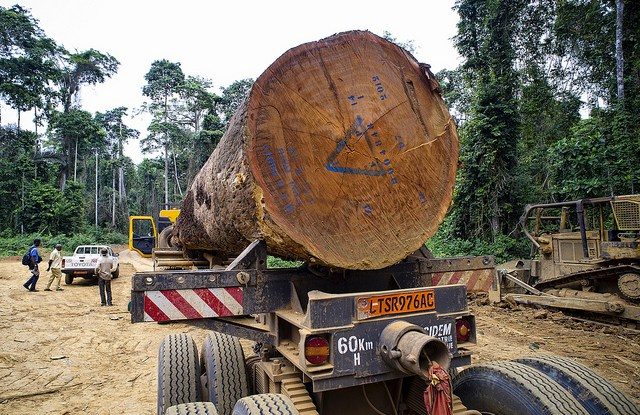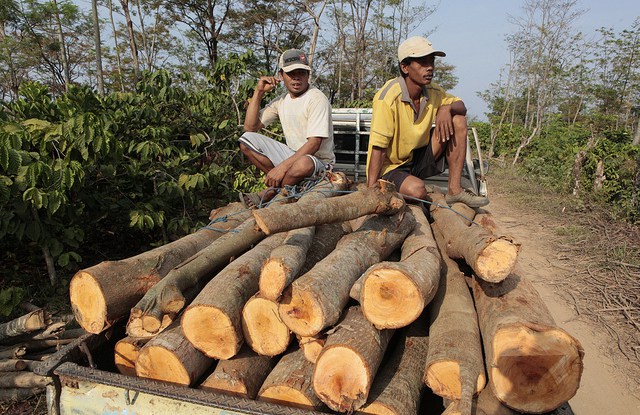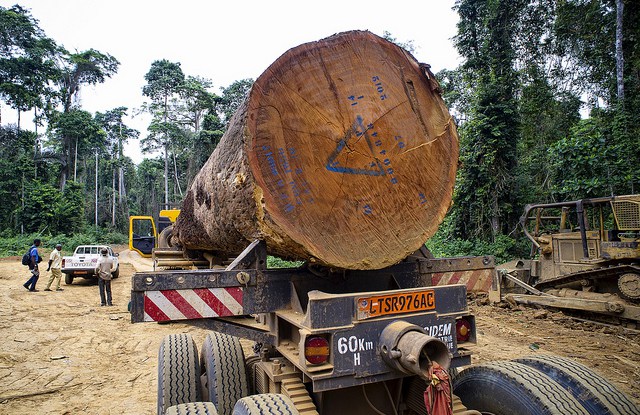
Illegal activity in Mozambique’s forestry industry has increased alongside a surge in Chinese demand for Mozambican timber, leading to negative effects for the industry and for the sustainability of the country’s forests. But this could help spur timber and trade policy change, researchers say.
Since China imposed a domestic logging ban to preserve its own forests in 1998, its expanding economy has steadily become hungrier for African wood. “China’s demand for timber has increased dramatically over the past 20 years, so that today, more than 80 percent of Mozambican timber exports are destined for China,” wrote the authors of Chinese trade and investment in the Mozambican timber industry: A case study from Cabo Delgado Province, conducted by the Center for International Forestry Research (CIFOR). Much of the Mozambican wood sought by China is jambire, used to make antique-style furniture popular in the Chinese market, according to companies interviewed for the study.
EXPORT OF RAW LOGS BANNED
While Mozambique’s forestry sector was specializing to supply that niche, the national authorities banned the export of raw logs in 2007, intending to increase local timber processing and create jobs in sawmills in the southern African country.
Yet researchers found that the demand from Chinese carpenters is for raw logs, which are easier to carve into traditional designs in Chinese workshops. “Processing timber locally in Mozambique into products that meet the Chinese demand is considered difficult due to a lack of the skills needed to produce such furniture,” researchers wrote.
“The log export ban seems to have been implemented without sufficient research, and it is actually decreasing the value of Mozambican exports,” said Sigrid Ekman, the publication’s lead author.
An unintended consequence of the policy is to encourage illegal exports of first-class logs, which the scientists found to be profitable.
According to their estimations, the profit on a container of raw logs taken illegally from Mozambican forest to Chinese market is much higher than the profit on a container of sawn wood. This takes into account not only shipping costs but also the bribes distributed to ensure local officials look the other way.
CONCESSIONS WITHOUT MANAGEMENT PLANS
The intersection of Mozambican forestry policy and Chinese business practices has highlighted problems in the attribution of logging titles, according to the authors of another CIFOR paper exploring the differences between concession holders of various nationalities in Cabo Delgado. According to available statistics, Chinese companies operate nine of the province’s 30 concessions in 2010.
Concessions are long-term, large-scale logging titles granted to companies that submit detailed forest management plans — in contrast to simpler, short-term licenses, which are reserved for Mozambican nationals. In recent years, the Mozambican government has promoted concessions to encourage sustainable practices and attract more stable investors to the forestry sector.
Countries need regulations like these, but in this case you must find a market for the sawn wood — otherwise you’re just driving the trade further underground
For this analysis, the scientists studied the concession-level data from Cabo Delgado and found that one in three operated without having obtained the authorities’ approval on the way they were planning to exploit — and preserve — forest resources in their area.
According to the analysis, “The group with the largest relative share of concession area operating without an approved management plan shifted from Mozambicans (64 percent in 2007) to Chinese (41 percent in 2009).”
This tallied with anecdotal evidence gathered through interviews in the sector that some Chinese operators were willing to “find shortcuts to circumvent the legal requirements,” said CIFOR researcher Sheila Wertz-Kanounnikoff, the paper’s lead author.
‘ENFORCEMENT IS THE PROBLEM’
In the absence of approved management plans, logging companies operate without knowing how many trees of each species stand on their concessions nor how many can be cut without harming the forest’s capacity to regenerate in the future.
Poor enforcement also hampers controls on shipments and affects the ban on unprocessed timber exports. Previous research by Wertz-Kanounnikoff, using available trade statistics, showed that since 2008, the quantity of exported logs in total timber exports from Mozambique to China is three to five times higher than the officially recorded number.
Ekman et al. linked this discrepancy to the side effects of the log export ban: “The research findings reveal strong incentives for exporting timber illegally as logs, as processing is virtually unprofitable,” they wrote.
Their conclusion: “The lack of enforcement and high levels of corruption allow easy entry to the industry. Several actors extract and export logs in a largely uncontrolled fashion. Given the significance of the timber industry to the Mozambican economy, the current status quo is alarming.”
Yet the recent research also identifies avenues to remedy those problems.
OPPORTUNITY FOR LEGALITY
Although some Chinese concession holders were found to only leniently comply with legal requirements, Wertz-Kanounnikoff pointed out that they still sought formal logging titles instead of taking advantage of poor law enforcement to source fully illegal timber.
“I see it as an opportunity: There is a willingness to bring timber to legality before it is brought to market and export,” she said.
Meanwhile, the Chinese government has been developing guidelines for sustainable practices among its overseas investors, but “many have never heard of them,” Wertz-Kanounnikoff added.
Regarding the difficulties with the log export ban, Ekman said she did not oppose trade regulations in principle: “Countries need regulations like these, but in this case you must find a market for the sawn wood — otherwise you’re just driving the trade further underground.”
Based on the fact that there are strong economic incentives to violate the log export ban, Ekman suggests the possibility of lifting the ban. “If you want to develop jobs and create value, you need to find new markets,” Ekman said. “If there is no capacity for that, allowing the export of logs may be the best way until you have a better policy.”
Over the long term, the researchers said, Mozambique needs to weigh the economic benefit of its international timber trade against the ecological effects of logging as it is currently practiced, and find new ways to generate income from the sector without damaging the natural resource base and the local environment.
This research forms part of the CGIAR Research Program on Forests, Trees and Agroforestry.
We want you to share Forests News content, which is licensed under Creative Commons Attribution-NonCommercial-ShareAlike 4.0 International (CC BY-NC-SA 4.0). This means you are free to redistribute our material for non-commercial purposes. All we ask is that you give Forests News appropriate credit and link to the original Forests News content, indicate if changes were made, and distribute your contributions under the same Creative Commons license. You must notify Forests News if you repost, reprint or reuse our materials by contacting forestsnews@cifor-icraf.org.

